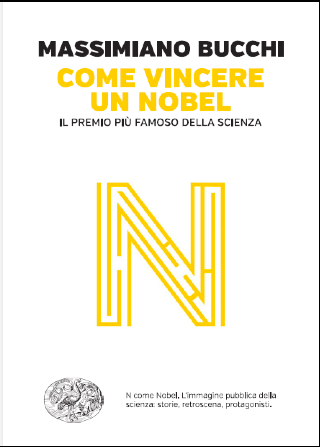作者在本书中透过分析诺贝尔奖来解释科学的公众形象以及它如何渐渐转型。诺贝尔奖的历史、故事以及争议在不同的社会、整治以及文化里塑造了科学许多不同的形象,这个形象也不停地在变化中。
这是一个独特、简单以及吸引人的方式来帮助更多人了解科学在社会上的贡献。我們透过这些故事以及人物——从最令人意外的诺贝尔奖得主,到爱因斯坦如何终于得到诺贝尔奖,到那些大众以为得了奖当时其实没有得奖,到获奖但后来他们的科学发现被驳斥的,到得奖后变成大明星或者被完全遗忘的得主——可以学到什么呢?
诺贝尔奖同时也有政治的意义:很多国家会竞争得到这个奖,毕竟获奖是全国的荣耀。而诺贝尔得奖仪式本身也有慎重的意义,几乎是给一位凡人一个圣人的名义。作者花了许多年研究诺贝尔奖的公众形象,更亲自到斯德哥尔摩的皇家科学学院的诺贝尔档案室里找出不少资料。这本书带你深度了解诺贝尔奖,更了解科学在我們社会上的重量。
关于作者:
Massimiano Bucchi是University of Trento的社会科学以及科技教授。他造访过亚洲、欧洲、北美以及大洋洲的许多大学担任教授。他出版过许多本书也在许多权威科学杂志里出版过文章。他最近出版的书是:Newton’s Chicken: Science in the Kitchen(2013年出版,并售出法国、芬兰、巴西、葡萄牙、西班牙、阿根廷以及韩国版权),以及A Fistful of Ideas: Stories of Innovations which have Changes our Lives(2016年出版)。他是国际科学文刊Public Understanding of Science的编辑。他经常为La Repubblica 以及La Stampa这些报纸贡献文章,同时也会上意大利科学电视节目Superquark。
www.massimianobucchi.it 。
目录:
Table of contents
I. How an incorrect obituary led to the most important award in science
The most famous testament ever
The young engineer who defended the testament with a revolver in hand
Those Swedish scientists who didn’t want the Nobel Prize
December 10th, five years later, in Stockholm
A prize which fascinates the media and the public.
More than a century of prizes (and polemics)
II. How does one win a Nobel Prize?
How to win a Nobel Prize by skipping vacations and without publishing a single line
Never judge a Nobel by appearances: the countryside doctor and the “San Diego mother” who won a Nobel Prize
It’s never too late (and it’s never too soon) to win a Nobel Prize
The long road to Stockholm
A week you’ll never forget
III. A prize without borders? No politics, please, we’re Swedish (scientists)
A prize without borders, or, science as a continuation of politics by other means
The “Olympics of Science”?
The Nobel Prize in time of war, Act I: to award or not to award, that is the question
“To the benefit of mankind”: Nobel prize-winner or war criminal?
The Nobel Prize in time of war, Act II: no politics, please, we’re Swedish (scientists)!
The (Stockholm) syndrome of the duck-billed platypus: is it chemistry, physics or medicine?
iv. And the winner is… not here! How Einstein had the Nobel prize and why he risked not having it at all
Stockholm, 1922: a seaside stroll
Bern, 1905: an employee’s “secret” office of theoretical physics
Every grand undertaking needs an enemy
Stockholm, 1922: Carl Wilhelm’s secret plan
Awarded but absent
The “Nobel Prizes with a bang” and the overdue ones. Will many potential laureates die before winning the prize?
Lobotomies and other vain hopes: prizes that shouldn’t have been awarded?
v. How not to win a Nobel Prize. Story of Lise and of other ghosts of the prize
Story of Lise, who went to Sweden but didn’t receive the prize
Winners who were (only) announced? The strange case of the Nobel Prize to Edison and Tesla which the press announced on the front page, but which was never awarded
Those “drowned” by the prize, or the Nobel Prize for Chemistry according to Primo Levi
“The most important photo in history” which didn’t win the Nobel Prize (or did it?)
“Fourth persons”: the physicist who almost won the Nobel Prize twice (in fact, maybe three times)
“Third persons,” or the Ringo Starr effect
All the colors of the Nobel Prize, and its most elusive ghost
vi. Does the prize make them beautiful? The importance of being a Nobel Prize winner
“The winner takes it all.” Pains and pleasures of the Matthew effect
Throw science (and the wife’s hand) on the front page!
“The wireless man” and borderless fame
How is a prize made famous? (Also) By awarding it to scientists who are already famous
Nobels are forever. Science between reputation and visibility
A(nother) Nobel in Sanremo
Some Nobels are more Nobel than others?
vii. The body of the (laureate) scientist
Einstein’s face
The secular cult of scientists
The body of the scientist and his relics
“Principles which pay tribute to molecules”: the Nobel Prize as a ritual of consecration
“Science as a bride”: the exceptional qualities and moral equivalence of scientists
The B side of the Nobel Prize: the boxes which nobody at the Academy of Sciences wants to open
Epilogue. Geniuses, heroes and saints. How the Nobel Prize (re)invented the public image of science
Acknowledgments
References
Appendix. All the prize winners from 1901 to 2016
Index of names

- 如何赢得诺贝尔:天才、英雄、圣人,诺贝尔奖以及科学的公众形象
- Come Vincere un Nobel (How to Win a Nobel Prize)
- 作者:Massimiano Bucchi
- 出版社代理人:Einaudi(意大利)
- 出版时间:2017年9月
- 页数:240
- 已售版权:
- 版权联系人:tina@peonyliteraryagency.com
内容介绍


